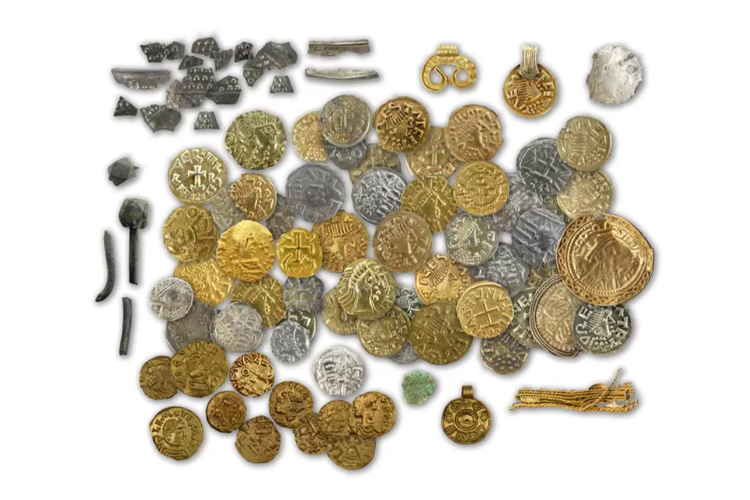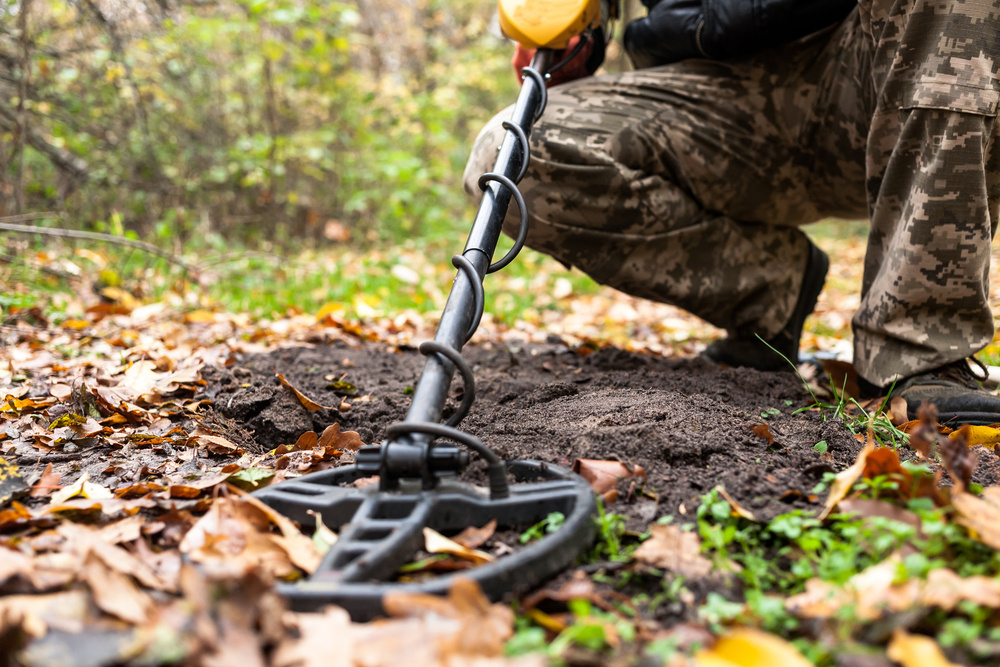The 10 Most Frequently Asked Questions About Metal Detecting
The 10 Most Frequently Asked Questions About Metal Detecting
Do you have an interest in metal detecting? Maybe you've heard about it from your friends, or you're just curious because it's still a bit mysterious to you. Don't worry, we're here to clarify it for you.
In this blog, we'll answer the most frequently asked questions about metal detecting. This will help you get started easily with your own underground quests. Let's explore the fascinating world of metal detecting together!
Question 1: How does it actually work?
Let's start at the beginning! A metal detector is a device that simulates a fairly simple physical principle: electromagnetic induction. To achieve this effect, the detector has a 'coil' (at the bottom of the shaft) with two copper coils inside. The first coil transmits: it is powered by electrical current and sends a magnetic field into the ground. If there are metal particles or conductive metal objects in the ground, they alter the magnetic field. The second coil receives: this coil captures the altered magnetic waves and sends this information to an electronic unit at the top of the shaft. This unit analyzes the data and converts it into audio signals, supplemented with visual cues (depending on the detector model). By interpreting these sounds and signals, the detectorist can determine the presence of metal in the ground and sometimes estimate the size, depth, and type of metal.
Question 2: Can you really find anything with a metal detector?!
With metal detecting, you can find all sorts of things! Our soil contains nearly 3000 years of metal history, making it a treasure trove of stories from the past. Whether it's lost or hidden coins from different eras, old objects that were lost or left behind, or modern metal debris, there's all sorts of things hidden beneath our feet. You'd be surprised how much 'pollution' is in the ground if you've never searched with a metal detector before. But if you give it a try, even for an hour or two, you're almost certain to find a few coins and a lot of metal debris.
Question 3: Can you set a metal detector to detect only gold?
The answer to this is no! To understand why you can't do that, a bit of explanation is needed. These devices are called metal detectors, but they actually detect how well something conducts electricity, not what type of metal something is. How well something conducts electricity depends on the size of the object, not the type of metal!
So, you can't set a detector to only find gold, silver, or bronze. What you can do is exclude certain types of metals with something called discrimination, and that option is available on all good metal detectors. For example, you can set it up so that you don't find small iron objects like nails, small iron pieces of tools, and other iron debris. If you have the discrimination set up to ignore small iron things, then you know that when your detector gives a signal, it's not a small iron object!
Question 4: Can you easily find treasures with a metal detector?
That depends on what you mean by a "treasure" because with metal detecting, you're not specifically searching for treasures; you're looking for things that are lost or hidden. For a detectorist, a simple piece of metal or even a single coin can be a real treasure because they're aware that they're uncovering something from the past. They immediately want to know what it was, what time period it's from, and why it was in that location. All those questions spark the imagination and let you travel through time in a way!
When we talk about a "treasure" in the most usual sense, treasures are indeed found every day. However, it's much more common for people to find treasures without a metal detector, such as when digging up a tree, renovating a building, or cleaning out a basement or attic... So, if you look at the ratio of treasures found by the approximately 100,000 metal detector users in the Netherlands compared to the remaining 18 million Dutch people, metal detecting is just a very small part of it all.
That being said, a metal detector is probably the best tool to make sure you don't overlook a treasure!

Found by: Martin and Gerben in the Netherlands!
Question 5: How deep do you have to dig to find the oldest coins?
It may sound surprising, but coins (and other finds) are usually only a few centimeters below the surface, regardless of how old they are! If we had to dig several meters deep to find items, our fields would already look like huge molehills, and metal detecting would be banned! Note: Legally, you are allowed to dig up to a maximum of 30 cm intentionally for antiquities, provided you have the landowner's permission.
80% of finds are made at depths of less than 15 cm. Sometimes, you can even find them right on the surface, so the most observant people can spot them with the naked eye!
The depth at which you find something does not depend on how old it is. The ground is constantly moving, "alive," and is constantly disturbed by factors that can change the depth at which objects are buried. Roots, humus, worms, rabbits, foxes (and other digging animals), as well as all other underground life, disturb the upper layers of the ground. Frost and thawing of the soil also help move buried objects or coins. In the forest , storms can uproot trees and expose metal objects. And don't forget that agricultural land has been plowed for almost 150 years. This means that objects in the ground are moved every time the field is plowed, so you can get different results each year with a metal detector in the same spot!
Question 6: Can you search with a metal detector in the rain?
Most modern metal detectors are waterproof, which means they are designed to function in light rain. However, it is still advisable to use a protective cover to shield the electronic compartment from rain and dust.
When you're outside, you'll notice that rain can actually be an advantage because it can improve the detector's performance. Since water is a conductor, and the detector uses electromagnetic waves, wet soil can better transmit signals through the ground, allowing it to detect deeper objects.
Question 7: What should I do if I find something?
In the Netherlands, you are legally required to report any find that may be of interest for art, history, or archaeology to the municipality. For all other finds, you are considered 50% owner, along with the owner of the property where the find was made. For example, if you find a stash of gold bars on your own property, and no connection can be established with a previous owner of your property or another person, then the find is 100% yours.

Question 8: Where can I search with a metal detector?
From a legal perspective, metal detecting is subject to a permit system and not a prohibition system. This means that you can search anywhere with a metal detector as long as you have permission from the landowner and it is not an archaeological site. It is illegal to search for archaeological objects without prior permission from the relevant authorities.
From a practical standpoint: the goal of metal detecting is to find places where people have been and activities have taken place because that's where the likelihood of lost or hidden objects or coins is high. Think of an old path, a river, a garden, and so on.
Also, see our detailed blog on this question
Question 9: Can I use a metal detector abroad?
Yes, for example, in France, you can use a metal detector as long as you abide by the law. However, some beaches and areas have specific rules, so it's wise to inquire locally beforehand. There are also areas where metal detecting is strictly prohibited due to the presence of unexploded ordnance from World War I and II (such as in Normandy and Picardy). Furthermore, each country has its own legislation, so it's advisable to research thoroughly before taking a metal detector with you when traveling abroad. If you plan to search at your holiday destination or take your detection equipment abroad, be sure to look into the local regulations.
Rules for a few well-known countries:
- Rules for metal detecting in Spain
- Rules for metal detecting in Germany
- Rules for metal detecting in Belgium
- Rules for metal detecting in France
Question 10: Are there Metal Detecting Associations and Events?
You often like to share a hobby with others! That's why metal detectorists enjoy meeting each other and searching together, although it's not a strict rule. In the Netherlands and even abroad, there are many associations and clubs for metal detecting enthusiasts! Wherever you are, there's probably a local or regional club near you. Meeting other detectorists can also help you get better at your hobby more quickly. You can share experiences and finds with people who share the same passion, which can be a lot of fun. You can also connect with other detectorists in your area through online discussion forums. It's common to share your finds there and ask for help in identifying them (to know what they were used for, how old they are) or to learn how to restore them to make them look nice again.






